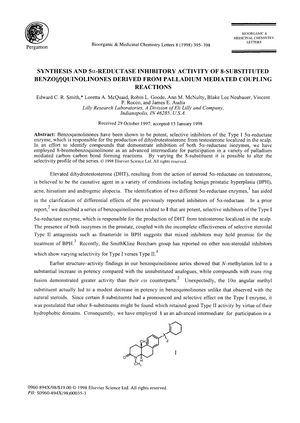Synthesis and 5α-Reductase Inhibitory Activity of 8-Substituted Benzo[ƒ]Quinolinones Derived from Palladium Mediated Coupling Reactions
February 1998
in “
Bioorganic & Medicinal Chemistry Letters
”

TLDR Some newly made compounds can block an enzyme linked to hair loss and prostate growth, with one in particular being very selective.
In 1998, researchers synthesized 8-substituted benzo[a]quinolinones to find inhibitors of the 5α-reductase enzyme, which is involved in conditions like benign prostatic hyperplasia and androgenic alopecia. They discovered that while the phenylacetic acid derivative 3 had weak inhibitory effects on the Type II enzyme, the amides 4a-c were not effective. However, compounds with styryl carbocycles or quinolines were potent inhibitors, especially the trans-3-quinolinyl compound 10, which showed high selectivity for the Type I enzyme. The acetylene 6 was the least selective, indicating the possibility of creating nonselective inhibitors. The study utilized enzyme assays with human scalp and prostatic enzyme preparations to measure the conversion of testosterone to dihydrotestosterone but did not involve human participants.





